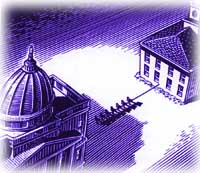 |
 |
Jewish World Review / Nov. 17,1998 /28 Mar-Cheshvan, 5759
 By Grace's G-d
By Grace's G-d
In Medford, N. J., a six year-old is humiliated by his public school teacher on his first attempt at reading publicly. Impossible in these days of self-esteem building? Well, not when the story he wanted to read was the tale of the biblical Jacob and Esau.
By Nat Hentoff
IN 1996, GRACE OLIVA, a first-grade teacher at the Haines Public School in
Medford, N.J., allowed students who had reached a certain level of
reading proficiency to read a story of their own choosing to the class.
Zachary Hood, then 6 years old, picked a story out of the Beginner's
Bible. From the Book of Genesis, it is called "The Big Family," and it told
of the reconciliation of two brothers, Jacob and Esau, who had once
quarreled bitterly. This is the story in full:
"Jacob traveled far away to his uncle's house. He worked for his uncle,
taking care of sheep. While he was there, Jacob got married. He had 12
sons. Jacob's big family lived on his uncle's land for many years. But Jacob
wanted to go back home.
"One day, Jacob packed up all his animals and his family and everything he
had. They traveled all the way back to where Esau lived. Now Jacob was
afraid that Esau might still be angry at him. So he sent presents to Esau. He
sent servants who said, 'Please don't be angry any more.' But Esau wasn't
angry. He ran to Jacob. He hugged and kissed him. He was happy to see
his brother again."
It was to be the first time Zachary had read to the class, but the teacher
said he could not read that story because it was religious. Humiliated, the
boy came home, his eyes red from crying, and told his parents.
His mother, Carol, complained and, she says, the teacher explained: "It's a
public school, and the Bible is not allowed." Carol Hood later told the
Rutherford Institute -- which initially brought the case to court -- that the
principal, Dr. Gail Pratt, then said the story was "prayer" and prayer is not
allowed in the public schools. She suggested to the mother that the boy
should be put in private school and added -- Carol Hood told her lawyer
-- "I have enough trouble with Jews." Michael Reilly, a teacher in the
district, told me that Carol Hood repeated to him the principal's reference
to Jews. The principal denies she said that.
The judge may have been unaware of the U.S. Department of Education's
guidelines on religious expression in the public schools, which state:
"Students may express their beliefs about religion in the form of homework,
artwork, and other written and oral assignments -- free of discrimination
based on the religious contents of their submissions."
Nonetheless, the Third Circuit Court of Appeals -- without hearing oral
arguments -- affirmed the lower court's decision that Zachary Hood should
have been silenced.
In a remarkable amicus brief to the Third Circuit Court of Appeals
supporting the school, the Americans United for Separation of Church and
State, the Anti-Defamation League and the American Jewish Congress
gravely charged: "Zachary Hood alleges a deprivation of what amounts to
a constitutional right to proselytize his classmates in class regardless of the
teacher's considered judgment that the selection was educationally
inappropriate" (emphasis added).
There are times, and this is one of them, that certain institutions zealously
intent on keeping public schools religion-free become mirror images of Pat
Robertson's insistence that this is a Christian nation.
There is no mention of God or miracles in the story that Zachary wanted to
read. And there is not even a mite of proselytization in that story.
Zachary is now represented by the Becket Fund for Religious Liberty. If
the Supreme Court takes the case, I hope it reminds the nation of what
Justice William Brennan -- a firm adherent of the Establishment Clause --
said in his concurring decision in a school case, Abington School District v.
Schempp (1963):
"Not every involvement of religion in public life is unconstitutional."
Michael Reilly has been a teacher for 28 years in Zachary Hood's school
district. Last summer, he was the union's chief negotiator for the new
contract. Reilly wrote to local papers saying Zachary should have been
able to read his story because it was about a universal theme --
forgiveness.
The president of the local teachers' union sent a letter to the entire
membership saying he was "appalled" at Reilly's decision to "go public" and
"not be supportive of one of his fellow members."
And teachers from Zachary's school told Reilly he would be purged from
the union if he does not recant and apologize. Reily tells me he will not
comply. "I thought," he said, "the issue was religious censorship. Now I
realize it is free speech itself that is fundamentally under attack."
JWR contributor Nat Hentoff needs no introduction.
